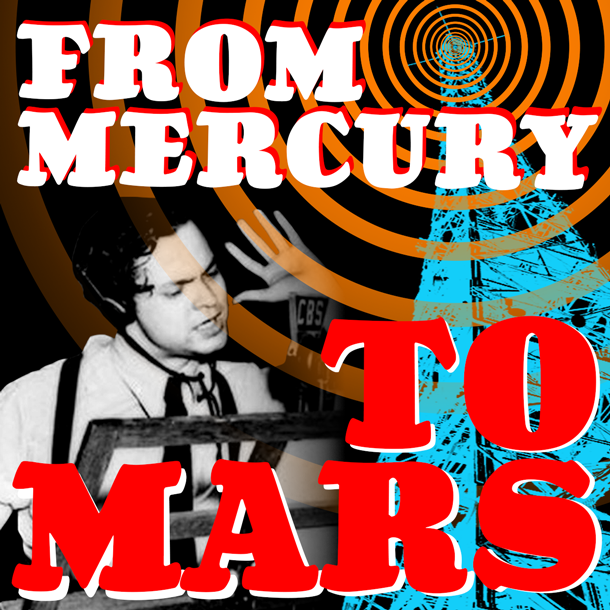From Mercury to Mars: Introducing Antenna’s New Radio Studies Series
 And now, we interrupt this broadcast for a message from our contributor Neil Verma: At 9:00 pm on July 11, 1938, the Columbia Broadcasting System unfurled a plush Tchaikovsky concerto to welcome 23 year-old wunderkind Orson Welles and his Mercury Theater troupe to national airwaves for a show destined to become the most famous dramatic radio anthology ever aired.
And now, we interrupt this broadcast for a message from our contributor Neil Verma: At 9:00 pm on July 11, 1938, the Columbia Broadcasting System unfurled a plush Tchaikovsky concerto to welcome 23 year-old wunderkind Orson Welles and his Mercury Theater troupe to national airwaves for a show destined to become the most famous dramatic radio anthology ever aired.
The Mercury Theater on the Air came with hype. Welles was fresh off a streak of innovative stage adaptations of Shakespeare’s “Julius Caesar,” Shaw’s “Heartbreak House,” and Marlowe’s “Doctor Faustus,” pledging in a New York Times article to “treat radio with the intelligence and respect such a beautiful and powerful medium deserves.” A jab at his rivals? Maybe. Legends tell of 17-hour writing sessions, of rows minutes before airtime between Welles, producer John Houseman, and composer Bernard Herrmann, of sound men abusing baskets, watermelons, toilets, lawnmowers to make audio. Time described Mercury’s ambition as “bounded north and south by hope, east and west by nerve.”
Welles was by then a radio veteran, the hero of The Shadow and impersonator of newsmakers from Sigmund Freud to Fiorello laGuardia on The March of Time. Hundreds of extant recordings link Welles to rousing Norman Corwin pageants,Columbia Workshop experiments, strident war shows like Ceiling Unlimited, buffoon turns on the Jack Benny and Fred Allen Shows, picaresque Harry Limeadventures, dense thrillers on Suspense, romances on Lux Radio Theater, diplomacy on Hello Americans, and on and on. Welles gave radio new forms, as radio informed his filmmaking profoundly – the sound of Citizen Kane (1941) the characters in Mr. Arkadin (1955), the vocals in Touch of Evil (1958), the theme of F is for Fake (1974). Welles invented a cinema that is, among other things, a kind of radio play you can see.
Mercury (and the Campbell Playhouse it became) undertook plays like “Dracula,” “Treasure Island,” “The 39 Steps,” “Rebecca,” “Jane Eyre,” and “The Magnificent Ambersons” and dozens of others. But none would be remembered were it not for the “War of the Worlds,” adapted from H.G. Wells’s novel by Howard Koch. In October of 1938, “WOTW” aired to six million listeners, hundreds of thousands of whom misheard it as news. The “Panic Broadcast” became a series of fables: listeners treated for shock in Newark; families on Boston rooftops watching the fires of New York in the distance; an Indianapolis church service interrupted by a parishioner telling congregants “you might as well go home to die”; bomb threats and a police raid on CBS headquarters. Three quarters of a century later many agree with the New York Tribune’s Dorothy Thompson, who declared the Invasion “one of the most fascinating and important events of all time,” but the meaning of that event also feels unclear, growing more ambiguous with time. Today, the alien invasion is itself increasingly alien.
To confront that issue and to open Mercury to new kinds of critical practices in sound studies, Antenna is partnering with the sound studies blog Sounding Out! over the next six months to bring you a 12-part series entitled From Mercury to Mars: Orson Welles on Radio after 75 Years. I’m honored to serve as Sounding Out!‘s Guest Editor, and Andrew Bottomley will be curating the parallel series here at Antenna. We’ll be bringing you authors who engage aesthetic, historical, and political aspects of Welles’ radio work with a depth and intensity unusual in Welles studies.
The inaugural post in the series, “Hello, Americans: Orson Welles, Latin America, and the Sounds of the ‘Good Neighbor,'” has just been published over at Sounding Out!. Please check it out here. It is written by Cornell Comparative Literature Professor and SO! contributor Tom McEnaney, who has been working on a book project involving radio and the “neighborhood” of the Americas. I’m thrilled to welcome Tom’s nuanced and provocative take on Welles’s adaptation of Joseph Conrad’s Heart of Darkness and his Hello, Americans program, and I hope it will encourage you to stay with us as the series unfolds.
Antenna‘s first post in the series will appear here next week. And like Welles, we’ve got a few tricks up our sleeve. Stay tuned.


